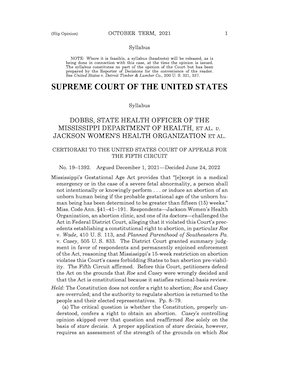
Statement from O. Carter Snead, professor of law at Notre Dame Law School, concurrent professor of political science at the University of Notre Dame, and director of Notre Dame’s de Nicola Center for Ethics and Culture:
“In today’s historic decision in Dobbs v. Jackson Women’s Health Organization, the U.S. Supreme Court has correctly overturned fifty years of grievously flawed and constitutionally unjustified abortion jurisprudence including Roe v. Wade, Planned Parenthood v. Casey, and related precedents, restoring the right of the American people to create laws and policies that protect human life at all stages of development and offer comprehensive support to women, children, and families.
Those who have worked tirelessly to support unborn children and their mothers have reason to rejoice today, as they now redouble the efforts they have long pursued for the intrinsic equal dignity and value of every human life and to create a society where every child (born and unborn), mother, and family is welcomed into a network of support and protection, and loved unconditionally, from conception throughout the human lifespan.
The University of Notre Dame is institutionally committed to “to the defense of human life in all its stages,” recognizing and upholding the sanctity of human life from conception to natural death (cf., https://news.nd.edu/news/notre-dame-adopts-new-statement-and-principles-in-support-of-life/). For our part, the de Nicola Center is proud to advance that commitment through our own efforts and programming, particularly our recently launched “Women and Children First” initiative. This initiative is our signal contribution to the ongoing effort to care for women, children (born and unborn), and families in need through research, teaching, service, public engagement, and witness across a variety of disciplines and contexts, including such complex issues as health care, housing, education, employment, poverty, racial justice, criminal justice reform, adoption and foster care, religious liberty, and international human rights.
We are just at the beginning of this project, but we hope that, through its efforts, Notre Dame can be a leading witness not only to the sanctity of every human life but to the radical hospitality at the heart of the pro-life movement in which everyone counts, and all are welcomed into the human family in love, friendship, and support.
All of these efforts require Americans to work together to find common ground among those with whom we disagree. In a particular way, we extend the hand of friendship to those who might be distraught about today’s opinion, and recommit ourselves to working together with all people of goodwill for a more just and merciful future where every human being is welcomed in life and protected in law.”
